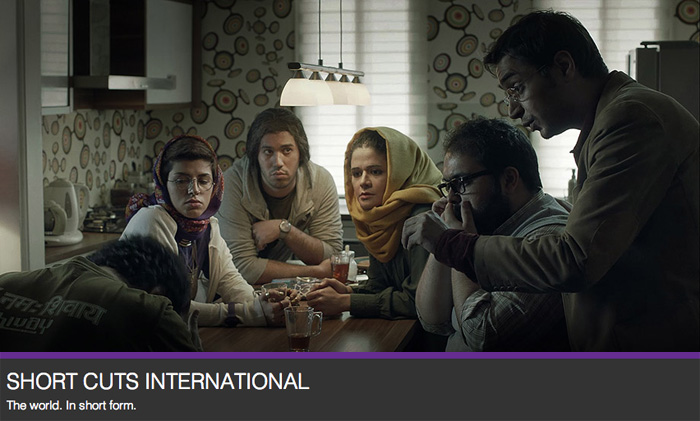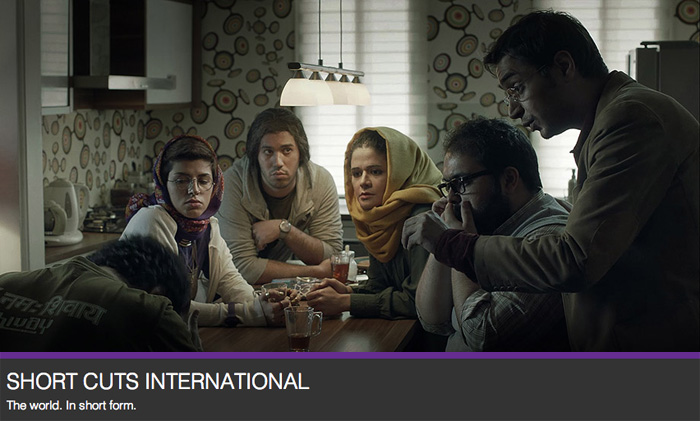
Thirty-six short films were selected as part of the Toronto International Film Festivals 2014 brand new Short Cuts International. Expanding their slate of shorts to encompass work from all over the world is a logical progression that I’m surprised hadn’t happened before now. Much like TIFF showcases many features placed on the shortlist for Oscar glory, the pool of shorts has increased to do the same.
Programme 1
Premiering Friday, September 5th at 7:30pm | TIFF Bell Lightbox Cinema 3
• Chop My Money, dir. Theo Anthony, 13 min.
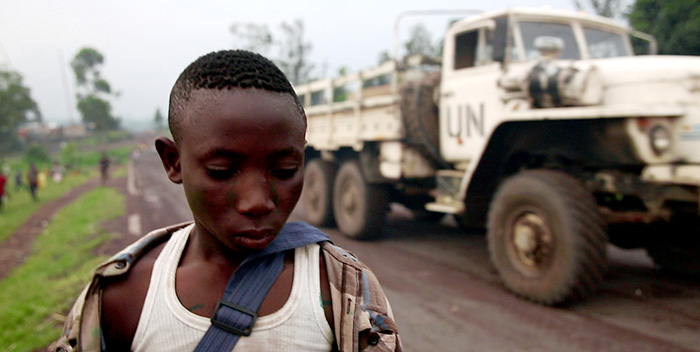
Give a street kid in the Eastern Democratic Republic of Congo some attention with a camera and he’s going to provide you the type of footage perfectly suited for rockstar treatment. Is Theo Anthony glorifying the deeds of Manu Bahiti “Patient” Jean Christophe, warning us outsiders of the hard life children live hustling, or simply giving an unfiltered glimpse of this new Wild West? Chop My Money is a little of all three in descending order because you know Patient and his crew consisting of Guillain Paluku and David Muhindo are reveling in every second they’re given attention. Of all the kid gangsters stealing and brawling, they’re the ones that the Western world is going to meet. So they might as well make it look good. This is a gorgeous documentary with some stunningly composed shots cut against music by Dirty Beaches. Think Romain Gavras‘ video for Justice‘s “Stress” only completely real and without the senseless violence unto innocent bystanders along the way. We receive a little boxing between adolescent warriors towards the end in a kinetic strobe of physicality, but besides that it’s mostly about showing the confidence and swagger they possess in excess. You know everything Patient says is true, though. This isn’t hyperbole. He’s probably killed before and will kill again somewhere in the pauses from cruising the streets with his boys, smoking and drinking, and grooving to the songs and naked girls his phone’s internet supplies. And honestly, you get the feeling that if this trio wasn’t out taking for themselves and damning the consequences, they more than likely wouldn’t have been alive to be the subjects of a short film. It’s survival of the fittest and it begins straight out of the womb. B |
• everything & everything & everything, dir. Alberto Roldan, 15 min.
• Playing With Balls, dir. Nanna Kristín Magnúsdóttir, 8 min.
• A Single Body, dir. Sotiris Dounoukos, 19 min.
• A Spark at Darkest Night, dir. Paul De Silva, 3 min.
• Tatuapé Mahal Tower, dir. Carolina Markowicz, Fernanda Salloum, 10 min.
• The Warren, dir. James Adolphus, 11 min.
Programme 2
Premiering Saturday, September 6th at 4:45pm | TIFF Bell Lightbox Cinema 4
• A Ceremony for a Friend, dir. Kaveh Ebrahimpour, 14 min.
• GROWING PAINS, dir. Tor Fruergaard, 21 min.

There is no subtly in the animal instinct category of metaphor where Tor Fruergaard‘s Growing Pains is concerned. Centering on a teenage boy (Elliott Crosse Hove‘s Fabian), this R-rated cartoon compares an adolescent’s sexual urges with that of a dog ready and willing to mount every female in heat he can find. What do we do to quell such a storm in man’s best friend? Castration. Luckily for newcomer in town Felicia (Amalie Lindegård), Fabian’s veterinarian mother Birte (Iben Hjejle) specializes in just that. But when the boy finds his desire for Felicia turning him into a werewolf whenever he’s the least bit horny, you have to wonder when Mommy will step in with her scissors there as well. Fruergaard and screenwriter Sissel Dalsgaard Thomsen pull no punches in their depiction of puberty’s effect on child and parent alike. Whether the over-arching juxtaposition of a lustful teen unable to control himself as though he’s transforming into a monster or the comically disturbing visual queues like Felicia sitting with her dog between her legs in a way that can only be described as provocative, this is far from Disney fare. Subject matter aside, however, you cannot deny the effectiveness of its message of teaching young men they don’t need to feel shame as a result of lust, young girls that being sexually active doesn’t make them a slut, and prudish parents to wake up to the fact they can’t psychologically neuter their kids. It’s a very funny and poignant coming-of-age story with twisted sensibilities, one that everyone watching can relate to on both sides of the coin. The short may be animated—brilliantly too I might add with what appear to be sets constructed out of paper for the cartoon characters to walk through—but that doesn’t mean watching a dog’s testicles get snipped is any easier to watch. While that may be the most jarring scene, don’t think it’s necessarily as far as Fruergaard and Thomsen will go. They are fearless in taking their parable to the extreme until Fabian and Felicia’s dog are barely distinguishable from one another. We simply must hope she’ll provide the patience and compassion to undo the damage his mother’s Puritanical mentality already inflicted. B |
• Ice Cream, dir. Serhat Karaaslan, 16 min.
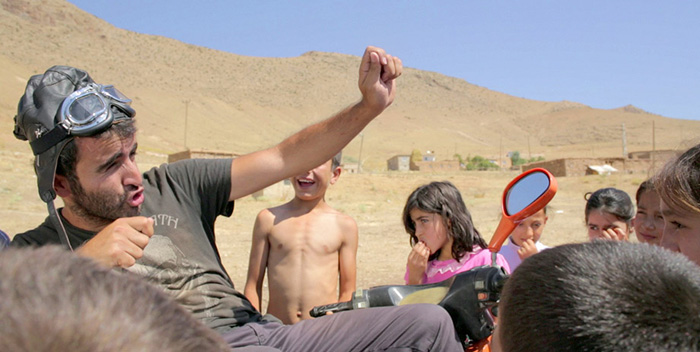
Instead of Scott Joplin‘s “The Entertainer” signifying an oncoming ice cream truck here in the States, Turkish children must keep an ear open for the whir of a motorcycle. No matter how engaged in a game of soccer the young village boys are, they are off to the races as soon as the prospect of this rarity of sweets arrives. Being that they have no money—and that the visiting purveyor knows this to be true—the barter system comes into effect in order for iron pipes, loose eggs, and plastic to serve as legal tender in exchange for a melting cone of vanilla. And just like here in America, there’s nothing that’s going to stop a child from ensuring he isn’t left without a treat. Written and directed by Serhat Karaaslan, Ice Cream depicts this universal struggle for dessert against a parent’s wishes and without remorse. Rojhat (Rojhat Deli) shouldn’t have even been playing soccer let alone running around for something to trade since his mother (Ebru Ojen Sahin) needed his help to give the baby a bath. Like any reasonably intelligent boy, however, he knows she cannot go chase after him with his sibling out in the sun. Unfortunately for him, anything of value the Ice Cream Man (Ubeydullah Hakan) might want is back home. So he must traverse Mom’s yelling to collect whatever he can all the while demanding she buy him a treat despite not doing anything to earn it. The result is a cute film that goes a bit long thanks to numerous tracking shots following Rojhat as he journeys for sugar. There is a reasonable amount of suspense with the mother intermittently chasing him as well as the threat that the seller could leave at any time, but ultimately you know little is bound to get in his way for too long. I’m not sure about Turkish customs but Rojhat deserved a good slap for his insubordination and I can’t help looking at the film as a how-not-to parent because he doesn’t get one. Hakan provides some nice humor with his Korean War anecdotes and Rojhat is a semi-likeable anti-hero. Being the killjoy that I am, I only wish the latter wasn’t rewarded for his deplorable actions. B- |
• Seven Boats, dir. Hlynur Pálmason, 10 min.
Programme 3
Premiering Sunday, September 7th at 7:00pm | Scotiabank Theatre 14
• Eye & Mermaid, dir. Shahad Ameen, 14 min.
• An Immortal Man, dir. Josh Koury, Myles Kane, 15 min.
• The Last Day of Summer, dir. Feike Santbergen, 18 min.
• A Single Life, dir. Job, Joris & Marieke, 2 min.
• Tricycle Thief, dir. Maxim Bessmertnyi, 18 min.
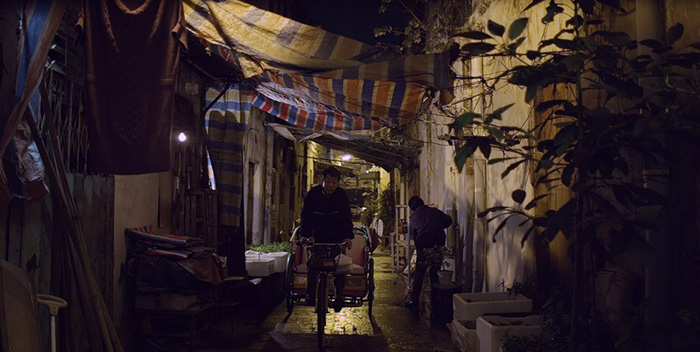
With a title like Tricycle Thief, Maxim Bessmertnyi‘s film could go two ways. Is it about someone who steals a tricycle or about a thief that rides one? There is also a third option: a hybrid of both. This is the direction the writer/director chooses with his Macau-set tale of a desperate man about to be evicted from his home. He lives in a city rich and vibrant with mainlanders coming in all the time to win big and leave with smiles on their faces, but for residents on the poverty line like he such success is nothing more than a pipe dream. Rather than sit back and let bad luck pile up, Ah Leong (Sam Leung) decides to take matters into his own hands. The evening didn’t start out this way, though. In fact, Ah Leong was in great spirits riding his tricycle taxi home to his wife (Chu Wing Mui) with dinner. It’s only when he sits to read the mail while she and some friends play Mahjong that the night turns sour. Clueless as to what to do about the eviction notice, he leaves for the casino. Maybe he’ll play, maybe he’ll wait for a rich fare, or perhaps he simply wants to wallow in silence as his coworkers play chess on break. It isn’t until a nicely dressed gentleman saunters over asking for a ride that Ah Leong bursts into action. Rather than accept the tricycle drivers’ “No, go hail a taxi”, Charles Ho (Aeson Lei) takes the one on the end (Ah Leong’s) and drives away. You’d assume what follows will be a run-of-the-mill chase through Macau of Ah Leong retrieving his only means of salary at a time when he cannot support his family, but all that gets rectified rather quickly. The two men are therefore left together in a situation that’s completely up in the air. It’s the good-natured stranger versus the tired citizen with a briefcase potentially housing the answer to Ah Leong’s prayers between them. Bessmertnyi isn’t interested in happily ever after or just deserts, though. He instead wishes to simultaneously show humanity’s flaws and grace when one’s back is against the wall. To him the contents of the case are inconsequential. It’s what Ah Leong is willing to do that matters as victims turn to thieves, thieves to victims, and unexplained actions remain mysteries. B+ |
Programme 4
Premiering Monday, September 8th at 9:45pm | Scotiabank Theatre 9
• (NULL), dir. David Gesslbauer, Michael Lange, 4 min.
• 8 Bullets, dir. Frank Ternier, 13 min.
• Aïssa, dir. Clément Trehin-Lalanne, 8 min.
• Boogaloo & Graham, dir. Michael Lennox, 14 min.
• Newborns, dir. Megha Ramaswamy, 8 min.
• Persefone, dir. Grazia Tricarico, 18 min.
• The Shove, dir. My Sandström, 14 min.

With an opening credit sequence recalling a 70s vibe via Quentin Tarantino, My Sandström‘s surrealist take on the paranoia of uncertainty delivers humor rather than the pulpy drama you may expect from the grainy picture and thick yellow text. There is a lot of this sort of playing with expectation involved right down to Tobbe’s (Magnus Sundberg) giant of a man being crippled by the absurdist “sentence” given to him by an inspector (Annafrida Bengtsson) of unknown origins walking the streets with a clipboard and authority. Here he is—a bar bouncer ensuring the safety of his patrons by refusing to let a drunk inside—being told that his shoving a belligerent guest has earned him one in return. The Shove is therefore a gritty take on the brilliantly hilarious How I Met You Mother thread that went by the name “Slapsgiving”. If Martina the inspector told him his victim would be able to get right up and push him in retribution, all would be fine. Instead she tells him his penance will be fulfilled some time in the next two weeks—a sentence meant to be psychologically overwhelming rather than physically. He now must walk with head on a swivel, constantly wondering who will suddenly break free from the periphery to wind up and push him as hard as they can with two hands. This means he has to consciously avoid cliffs, railings, or anywhere else the fall might cause lasting damage or death. Driven batty, a wedge forms between he and girlfriend Sandra (Hanna Ullerstam) until he cannot take the waiting anymore. In great subtle fashion, however, Sandström ensures the torment provides exponentially greater punishment than any shove ever could. It’s an existential conundrum making us wonder about our own lives and how procrastination or leaving things in the hands of others ultimately wrecks our psyches to the point of being unable to move. There are consequences to our actions and things we do to others have a way of coming back around karmically if we aren’t careful. Nevertheless, nothing anyone does in response to those acts can ever compete with the number our own guilt performs on us in the interim. B+ |
Programme 5
Premiering Wednesday, September 10th at 6:30pm | TIFF Bell Lightbox Cinema 4
• 130919 • A Portrait of Marina Abramovic, dir. Matthu Placek, 7 min.
• German Shepherd, dir. Nils Bergendal, 10 min.
• The Goat, dir. John Trengove, 13 min.
• LAVA, dir. James Ford Murphy, 7 min.
• Listen, dir. Hamy Ramezan, Rungano Nyoni, 13 min.

There is no more apt title for Hamy Ramezan and Rungano Nyoni‘s Listen except maybe Comprehend. A 13-minute gut punch dealing with the disparity of culture, language, and religion, to say too much would ruin the perfectly orchestrated dissemination of information from start to finish. It asks questions like: What do we do when we cannot ask for help? What can we do if those meant to help start reacting subjectively rather than with the victim’s wellbeing at heart? Our world has become so flat so quickly that we haven’t quite been able to keep up. It’s one thing to reside somewhere foreign, but it’s another completely to actually live there. Centered on a devout Muslim mother (Zeinab Rahal) covered head to toe, we witness her plea for help to get away from an abusive husband. She states her case, explains what he did, and relays the fact that she took her son (Yusuf Kamal El-Ali) with her and cannot return. The filmmakers use a static shot to show this, solely focused on the woman as another voice is heard. From here it cuts to that second voice—a Muslim translator (Amira Helene Larsen) interpreting the Arabic into Danish for the authorities also present (Nanna Bøttcher and Alexandre Willaume). We watch it a third time from the police officers’ perspective and finally understand exactly what’s happening. Add in the boy’s reaction as a secondary translator and you cannot help but feel sick. One believes a move out of a bad situation will be helpful, but just because the new home’s freedoms are beneficial doesn’t mean your accessibility to them is. Everyone we encounter is going to be possessed by his/her own prejudices and ideals above true altruism. So, tragically those ill-equipped to stand on their own may have no one left to turn to—not even those they love. A |
• Oh Lucy!, dir. Atsuko Hirayanagi, 22 min.
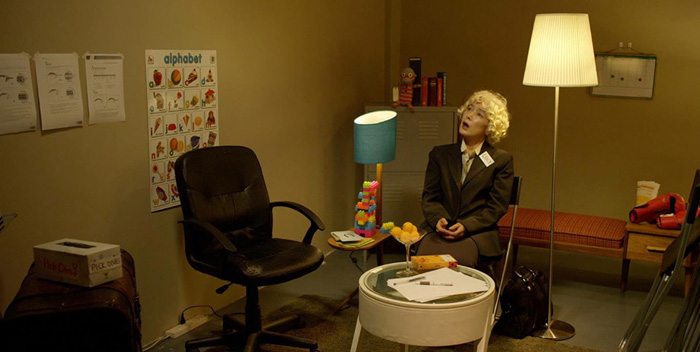
You know you’re in a rut when your sister calls to tell you not to talk to your niece and you do everything you can to do just that in the hopes of some semblance of excitement—or at the very least change. So chain-smoking Setsuko (Kaori Momoi) ditches work at the much younger Yu’s (Rian Nagashima) request to grab dinner and hear her proposition despite the warning. Needing money, Yu is looking for someone to take her place in an English course so she may recuperate the non-refundable six grand she shelled out. Knowing her aunt always talked about learning the language better, she seems the best choice to buy the class. Cautious about spending the money, it only takes one session with unorthodox instructor John (Billy Scott) to say yes. Fifty-five, cynical, and alone, there’s little that wouldn’t provide more stimulation than sitting at her computer all day inputting data, but John infuses an infectious excitement she of which she can’t get enough. Once the quiet office wallflower, Setsuko—renamed Lucy inside the English-Only classroom—begins to find her voice. It’s one with a very sharp edge that’s devoid of patience, allowing her to no longer get trampled over in silence. But just as she starts to emerge from her shell, the catalyst of this transformation begins changing course. First he brings another student named Tom (Keiichi Tsuda) and then he cancels class. Now without a release, Setsuko’s newfound candor begins to trickle out in public with her peers. Perfectly titled with the whimsical Oh Lucy!, Atsuko Hirayanagi‘s short feels like a sitcom where the final frame freezes on its star shrugging with a smile after someone lets out the phrase. Donning a blonde wig and nametag in class, the whole thing is somewhat absurd from the beginning. Yu’s proposal eventually proves more surreptitious than originally anticipated, the reasoning behind the class’ steady decline less than coincidental, and Setsuko’s transformation wholesale rather than merely behind closed doors. Just as the things that make her more fun also start rubbing people the wrong way, however, she must decide whether it’s worth going back to pushover status or if she’s come too far. It may result from a despicable ploy, but Setsuko is finally afforded the opportunity to live if only she allows herself the space. B |

